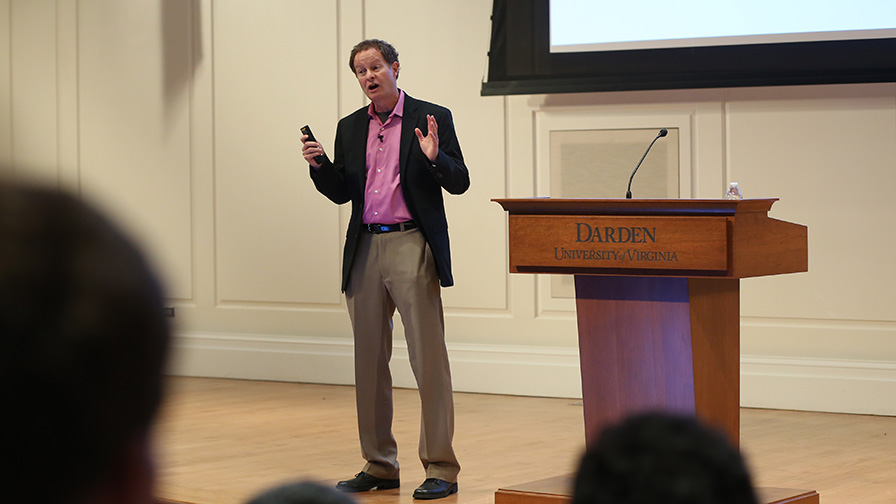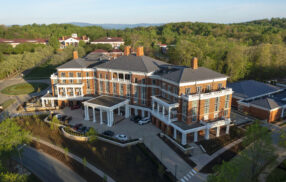
Whole Foods CEO Tells UVA Darden Students to Find Purpose Alongside Profits
By Dave Hendrick
Whole Foods co-CEO John Mackey came to the University of Virginia Darden School of Business to share news both thought-provoking and reassuring with an auditorium full of students.
Mackey, speaking at a Leadership Speaker Series event as part of Darden’s Business in Society Week, said Darden had probably not fully prepared students to be ideal, conscious leaders. He offered ample reassurance, however, that each student could be an effective, enlightened leader — they merely had to choose to be more thoughtful, loving and attuned to the needs of others.
Mackey has become one of the most visible and vocal proponents of the idea of “Conscious Capitalism”— a broad concept positing that, among other notions, businesses exist to create value, as opposed to simply make money. According to the Whole Foods co-founder, in order to grow as a conscious leader, individuals must develop the four tenets of emotional intelligence, analytical intelligence, systems intelligence and spiritual intelligence.
While the Darden education may have prepared students with some of those forms of intelligence, Mackey suggested it represented only the “ante to get into the poker game” for the modern business leader.
Mackey urged students to develop beyond more than analytical thinking. The conscious leader needs systems intelligence to “see how everything fits together,” the self-awareness and empathy that translates to emotional intelligence and the spiritual intelligence that allows one to discern purpose.
“For the person with high spiritual intelligence, purpose is everywhere,” Mackey said, noting that the trait was the key to guiding one through difficult times at senior levels of companies.
And what does a conscious leader actually do? First and foremost, they become a servant leader who puts the purpose of the company first and, in turn, gets others to embrace that shared purpose.
Whole Foods is successful, according to Mackey, in large part due to widespread buy-in to the company’s mission. As a leader of the organization, Mackey said he feels a responsibility to help people grow as well as to personally evolve.
Fostering self-growth is not narcissism, but when done with the right intentions, an act of service, Mackey said.
Mackey said one of his revelations as a conscious leader was to look for “win-win” solutions, as opposed to trade-offs. When one looks for trade-offs, and is mentally prepared to sacrifice ideals in the interest of expediency, you end up with subpar results.
If one sets out with the mindset to produce the mutually beneficial, you can often achieve the win-win most people seek.
Despite his shift in mindset, Mackey cautioned it did not suggest a lack of difficult decisions.
“There are always going to be tough ethical choices,” Mackey said, adding that choosing between right and wrong was easy, but the cases of “right and more right” presented the real dilemmas.
Mackey also made an impassioned pitch for bringing the concept of love “out of the corporate closet.” Far from being unrelated to the successful workplace, Mackey suggested that love “bubbles up” when one removes fear and allows authenticity into the organization.
The Whole Foods leader made clear that the choice to embrace the title of conscious leader was both entirely possible and a personal choice.
Although managing and fostering growth within oneself represented a significant challenge, it simultaneously offered the greatest opportunity for service, and the attendant rewards were limitless, the CEO said.
Said Mackey, “The greatest challenge you will ever have as a leader is leading yourself.”
The University of Virginia Darden School of Business prepares responsible global leaders through unparalleled transformational learning experiences. Darden’s graduate degree programs (MBA, MSBA and Ph.D.) and Executive Education & Lifelong Learning programs offered by the Darden School Foundation set the stage for a lifetime of career advancement and impact. Darden’s top-ranked faculty, renowned for teaching excellence, inspires and shapes modern business leadership worldwide through research, thought leadership and business publishing. Darden has Grounds in Charlottesville, Virginia, and the Washington, D.C., area and a global community that includes 18,000 alumni in 90 countries. Darden was established in 1955 at the University of Virginia, a top public university founded by Thomas Jefferson in 1819 in Charlottesville, Virginia.
Press Contact
Molly Mitchell
Associate Director of Content Marketing and Social Media
Darden School of Business
University of Virginia
MitchellM@darden.virginia.edu





